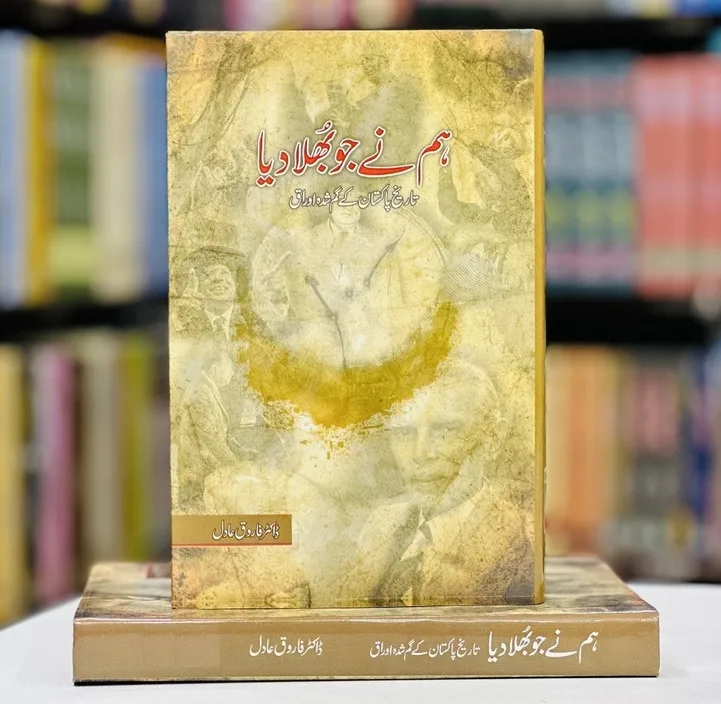By Agha Iqrar Haroon
The Book Hum Ne Jo Bhula Dia (This is What We Have Forgotten) is a blockbuster non-fiction, based on research and references to the political history of Pakistan. Written by veteran journalist, teacher, writer, and analyst Dr Farooq Adil, the book is a credible source of 75 years of political, administrative, and economic history of Pakistan.
Spreading over 32 chapters that are his articles already published in BBC Urdu documented what Pakistan had gone through. It is also tacit history of what we might not have known earlier. However, the never-changing truth is that since the first prime minister of Pakistan, almost everybody in this seat was a subordinate and had to do his job what was assigned. No error was acceptable by the powerful who could send the prime minister home sometimes without assigning any reasons and most of the time crafting a justification for sending her/him out of office.
Moreover, this book explained the hidden side of a tactical plan to get Pakistan involved in the Southeast Asia Treaty Organization (SEATO), and the Central Treaty Organization (CENTO). First, a crisis was created by the huge smuggling of wheat to Afghanistan in January 1953 and then the US entered the scene as a “savoir” and provided wheat to Pakistan when smuggling pushed the country to starvation condition. Dr. Farooq Adil does not comment on any political development without citing a reference anywhere. He immediately provides references after writing an event because he is a Doctor of Philosophy (Ph.D.) therefore he refrains from transferring anything to the reader without reference and his book is a kind of Ph.D. thesis instead of just a book penned by a journalist. This book is enough to place Dr Farooq Adil as a bonafide historian instead of a mere journalist.
The first chapter of the book about the Kashmir crisis and the second chapter about the foundation of Pakistan’s foreign policy are two documents that are as fresh today as they were 75 years ago. The imbalance between the United States and the defunct Soviet Union (now Russia) still is an integral part of Pakistan’s foreign policy. Pakistan since joining SEATO and CENTO has never come out of NATO’s networking and has never come out of this status of second fiddle to Western powers. Moreover, this situation is the same in another aspect: no elected government can steer foreign policy, which is the sole prerogative of non-elected powers in Pakistan. In the last 75 years, not a single retired diplomate, bureaucrat, military General, or politician ever decided to get citizenship of his or her or their children to Russia or China but thousands (if not millions), are living in Western world after their retirements or their children are citizens of western countries.

There is always a Sir Laurence Grafftey-Smith (1947–1951) who can threaten Pakistan to stay away from independent decisions and there is Sir Zafarullah Khan who listened to such threats. Dr. Farooq Adil explained the event how, when, and why the British High Commissioner in Pakistan Sir Laurence Grafftey-Smith warned Pakistani Foreign Minister Sir Zafarullah Khan that an upcoming visit to Moscow (by invitation) would be seen with mistrust by Americans and the British. Prime Minister of Pakistan Liaquat Ali Khan later canceled the visit. “Thank You America” is still written on every secret document that is not accessible to Pakistani nation as it was written on banners hanging over camels that were transferring US wheat from Karachi Port to the city.
I humbly disagree with the title of the book “Hum Ne Jo Bhula Dia” because no educated person who has little interest in the history of Pakistan can forget the stated history of Pakistan and the subtitle I also differ with is “Tareekh-i-Pakistan Ke Gumshuda Auraq” because these papers are everywhere even in today’s government offices in the form of files spreading over tables of our bureaucrats because nothing has changed so far in Pakistan.
I am privileged to have the company of veteran journalist, Dr Farooq Adil who carries 40 plus years’ experience including working as a PRO (Public Relations Officer) to the late President of Pakistan, Mamnoon Hussain. He is a humble person with deep thoughts always surrounding him.
I am avoiding explaining the content of chapters because I firmly believe that it would marginalize the desire to buy the book and read it for interested readers. The details of books are underunder for ready reference to buy the book that is already republished (second edition).
Hum Ne Jo Bhula Dia:
Tareekh-i-Pakistan Ke Gumshuda Auraq
By Dr Farooq Adil
Qalam Foundation, Lahore
ISBN: 9786275020172
Pages: 434





